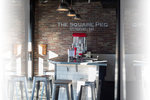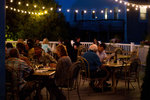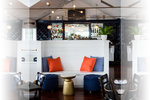









This May, the East Bay Chamber is running Ticket to Dine, a month-long event where ticket holders are encouraged to visit participating restaurants for indoor, outdoor, and even takeout dining. With every purchase of an entree, diners receive a free dessert and entry into a raffle held in June. Learn more at EastBayChamberRI.org.
"When we first opened, there were only a handful of restaurants in Warren,” recalls Joel Cary, who owns The Square Peg on Miller Street. “It wasn’t the hot location it is today.” Joel and his wife Amy opened the restaurant in 2011 – before the arrival of fan favorites like Eli’s Kitchen, Bywater, Metacom Kitchen, Revival Craft Kitchen & Bar, and Uptown Food & Spirits.
Today, Warren has a reputation for dining – one that perhaps even rivals that of Providence. Eli’s Kitchen won national attention when Chef Eli Dunn appeared on Food Network’s Chopped. Longtime legacies like The Wharf Tavern and Blount Clam Shack mesh seamlessly with newcomers like Rhody Roots and Waterdog. Even when the doors closed to beloved neighborhood staples, eager entrepreneurs made sure it wasn’t for good, and quickly reinvented spaces: Eli’s Kitchen was bought and transformed into the veggie-forward but still Southern-influenced Hunky Dory, Trafford Restaurant is ready to debut a renovation and rebranding following a devastating fire, and Palmer River Grille sprung up last summer in place of The Country Inn.
But while Warren has certainly carved a name for itself in dining over the last decade, other East Bay towns have begun their own restaurant resurgence. Creative coffee shop Kaffeology and purveyor of prepared Italian Bottega Bocconi have chosen Portsmouth for their second locations, while the sister to PVD’s landmark vegan food hall Plant City X opened its revolutionary drive-thru in Middletown. Newport saw the advent of hotel eatery Nomi Park, freestyle Italian restaurant Giusto, classic New England joint Knot Norms, and Simple Merchant Coffee. Tiverton made waves with the transformation of the former Provender into Groundswell, a destination for everything from garden and home to cafe and bakery dining. And amazingly – all of this happened in the middle of a very unconventional year.
For some, the pandemic presented an opportunity. This was the case for Sam and Joanna Ray, the new owners of what was once Eli’s Kitchen. Sam was out of a job when the restaurant he worked for closed and, serendipitously, Eli’s was looking to hire. Sam and Chef Eli Dunn formed a fast bond, and when Dunn decided to lean into catering for micro events, it just made sense for Sam to take over. “Eli felt like the restaurant would be in good hands,” Joanna explains. Fast forward, and the couple has opened Hunky Dory, a new restaurant serving up an equally new menu – but still sporting the intentional hospitality and nod to Southern cuisine that defined Eli’s.
“Today looks much different than when we wrote our business plan in December,” says Joanna. While they are grateful for the chance given to them because of the pandemic, they are also humbled: “Every day we see restaurants we love and admire pause or close, which is really, really scary.” For the Rays, it has hammered home the value of starting lean, which means Hunky Dory launched without a full staff or all the bells and whistles they hope to have one day. “We have no choice but to keep costs low until we know we’re safely out of this.”
“Nomi Park came into play after a conversation between Phil Hospod and Chad Hoffer,” explains Anna Burnley, member of the locally renowned Mission Group that opened TSK, Winner Winner (which sadly closed), and Mission in Newport. Hospod was in town looking at potential properties for his new hotel, The Wayfinder, and wanted a local restaurant group to be part of its food and beverage program. Naturally, he connected with Hoffer, the culinary genius behind Mission Group’s portfolio. The concept: Part bar, part cafe, part restaurant, open seven days a week for brunch and dinner, slinging everything from johnnycakes to spicy calamari inside a trendy space full of retro colors, playful patterns, and plenty of potted plants.
Two years in the making, Nomi Park finally made its big debut – though, being June of 2020, it wasn’t the grand opening the team had hoped for.
“We opened the same week most restaurants were re-opening,” says Burnley. This timing, she shares, was difficult to navigate as most patrons were heading back to their favorite spots, hanging out with the servers and bartenders they hadn’t seen in months, or simply not dining out at all. Then there’s the added fact that Nomi Park is coupled with another hard-hit industry: a hotel.
“We work hand-in-hand, we are family here,” Burnley says. “When the hotel struggled, we struggled. Much of our business is captured by the guests staying at the hotel. During the peak of COVID when people weren’t travelling, we suffered.”
New restaurants weren’t the only ones that suffered. “Restaurants were already a fragile business, not known for lucrative revenue but instead for surviving on tight margins,” Sean Smith, owner of 15 Point Road in Portsmouth, points out. He and his wife Carly opened the sophisticated seaside restaurant a little over a decade ago, pairing fresh ingredients with a view of the Sakonnet River. When restaurants were forced to close and revenue dropped to zero last year in March, the couple found they had spent most of their savings within two short weeks and decided to reopen for takeout to stay afloat.
“We are so thankful to our loyal customers who supported us with takeout orders,” says Sean. “They are the sole reason that we survived the first six months of the pandemic. The gratuities were so generous that it brought us to tears sometimes.”
With restrictions lifted in early summer, 15 Point Road welcomed customers back with outdoor dining and just ten serviceable tables indoors; however, investing in tent rentals, heaters and propane, disposable menus and silverware, extra cleaning supplies, and more meant the restaurant, already running on thin margins, was stretched to its financial limit.
“This time last year, I could barely get out of bed. I was so depressed and worried about the fate of the restaurant,” Sean admits.
“Navigating the pandemic has been tough,” Joel agrees. “The hardest part has been the mental exhaustion of a year-plus dealing with the uncertainty of what’s next.” The Carys worried not just about their own livelihood, but that of their small force of employees who had families of their own to feed.
Aside from the logistics of figuring out PPP, capacity restrictions, procurement of PPE, and spacing out tables, Joel says the two biggest challenges were restrictions on bar seating and transitioning to takeout. Losing the ability to seat patrons at the bar was huge, he explains, as alcohol sales are a major source of revenue, and while high demand for meals to-go might seem positive, it was hard for the small kitchen and staff to keep up with demand.
Staffing is an issue Joel continues to struggle with. “In the ten years at The Square Peg, we have never seen such a shortage in available staff,” he says. “We have had to close on Sundays because we just can’t find kitchen staff.” With people making more money collecting unemployment, Joel and restaurateurs around the country are having a hard time finding workers.
However, Joel is still optimistic: “Sales are up and I think the warmer weather will only further that trend.”
Brian Thimme, owner of Bluewater Bar + Grill in Barrington, echoes this sentiment. “I am very hopeful for this summer season,” he says. “People are ready to get back out there and enjoy life. We have survived COVID and managed the restrictions well, but we are ready to get back to normal.”
In 2010, Thimme purchased what was the Tyler Point Grill, a popular joint for 14 years. Initially, he kept everything the same, but quickly noticed Barrington needed something more modern and family friendly. So, after a dining room reno and menu tweak, Bluewater was born. “People loved it,” says Thimme, and it has since become a favorite in town.
When COVID struck, Thimme says they pivoted to takeout and curbside for ten straight weeks. “We received so much support from our regular guests from day one,” he says. “I feel very fortunate.”
This feeling of gratefulness and hopefulness is resounding in restaurant owners around the East Bay. “Loyalty to local is stronger than ever,” says Joanna. “The pandemic has created this fierce commitment to community and local businesses, and the amount of support we’ve been given is completely overwhelming. It’s gotten us through the many ‘are we insane for opening a restaurant in a pandemic?’ thoughts we have daily.”
“We’re dusting ourselves off and finally coming up for some air,” adds Burnley. “The outlook is bright! I mean, it has to be, doesn’t it? We are all in need of a morale boost. What’s in front of us is a promising summer, with bustling streets, and nowhere to park.”
Other items that may interest you





Comments
No comments on this item Please log in to comment by clicking here